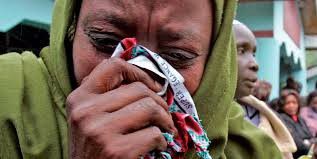God's People Will Include All Nations
1 The Lord says to his people, “Do what is just and right, for soon I will save you. 2 I will bless those who always observe the Sabbath and do not misuse it. I will bless those who do nothing evil.”
3 A foreigner who has joined the Lord's people should not say, “The Lord will not let me worship with his people.”
A man who has been castrated should never think that because he cannot have children, he can never be part of God's people. 4 The Lord says to such a man, “If you honor me by observing the Sabbath and if you do what pleases me and faithfully keep my covenant, 5 then your name will be remembered in my Temple and among my people longer than if you had sons and daughters. You will never be forgotten.”
6 And the Lord says to those foreigners who become part of his people, who love him and serve him, who observe the Sabbath and faithfully keep his covenant: 7 “I will bring you to Zion, my sacred hill, give you joy in my house of prayer, and accept the sacrifices you offer on my altar. My Temple will be called a house of prayer for the people of all nations.”
8 The Sovereign Lord, who has brought his people Israel home from exile, has promised that he will bring still other people to join them.
Israel's Leaders Are Condemned
9 The Lord has told the foreign nations to come like wild animals and devour his people. 10 He says, “All the leaders, who are supposed to warn my people, are blind! They know nothing. They are like watch dogs that don't bark—they only lie around and dream. How they love to sleep! 11 They are like greedy dogs that never get enough. These leaders have no understanding. They each do as they please and seek their own advantage. 12 ‘Let's get some wine,’ these drunkards say, ‘and drink all we can hold! Tomorrow will be even better than today!’”
Odro'bena Tu'dei Cini 'da Lidri Lu ro Lako
1 OPI ka ata ni nonye ekye: “Mìye taŋgye ago tase kado 'do ayani, tana ma oye ami opane ga ndriro ago ŋgaopeṛe maro aka'dana 'da. 2 Mäṛuna ànya se kayi Sabata äti ago kenjiyi ko iyi 'da. Mäṛuna ànya se koyeyi ŋgakozi ko iyi 'da.”
3 'Diatra se kodro'berube lidri OPI ro lako 'do kata ko ekye: “Endaro OPI lewena ma 'da ni lidri ndaro lakosi.”
Mano se eŋgyete rotiro kata ko ekye: “Ma maro te ce awi yi.” 4 OPI ka ata ni nonye ekye: “Ondro ka'do ami rotii mìro ma te Sabata äti si ago ondro ka'do nyàte tase kusi mabe 'do oyena ago nyàte tao'baro maro ätina 'diriro oko, 5 'dooko ayina ävuru amiro tana ndi Yekalu maro ya ago lidri maro lako ndrani aba ondro ka'do nyà'do gwo ŋgwàagoro ndi ndiriŋwa ro be drisi. Ayina ta amiro ndi äduako, änina ko tana ijene alona.”
6 Ago OPI ka ata atrai se kodro'beruyibe lidri ndaro be nda mätune iyi, se kuluyi nda be ago kayibe ruindu ndäri, se kayibe Sabata äti ago enjiyi ko ago kayibe tao'baro ndaro ätina 'diriro iyi ri ekye: 7 “Mezina ami 'da Zaiona, lutu alokado maro ya, mozona riyä 'da ämiri zo mätu ro maro ya, ago malena ŋgapäṛi ozaro ndi ŋgapäṛi se cini nyàbe ozona vo tori oloro maro dri ono ndi. Äzina Yekalu maro 'da zo mätu ro, lidri tu'dei cini ro ri.”
8 OPI Mbarapara se kologo lidri ndaro Yisaraele be kovole ni vo midiro yasi ono, ka ata ni nonye ekye ya oye drigba lidri azaka ezine rudro'bene ànya yibe.
Uluku Dri'bai Yisaraele rote
9 OPI atate tu'dei atrai ro ri ikyine oso koronyai vocowaro ronye, ikyine lidri tosine. 10 Nda ekye: “Dri'bai cini, Yisaraele ro, orivoya miako! Ànya cini niyi ŋga aza ko. Ànya orivoya oso kokye se ye kporo ko, kogbo ko 'do ronye, ànya kayi toto ugu u'du ago tori ka taezi ànya dri. Ànya leme u'du tawi! 11 Ànya orivoya oso kokyei se yagäru ekye iyi ronye se cu ŋga ojo ànya ko. Dri'bai kwoi kpa orivoya tavouniako. 'Dialo ka tase kusi nda be oyena ago ka kandrakado modo ndaro ro vona uṛina ayani. 12 Wa umvu'bai kwoi kayi ata ekye: ‘Mi'de mezi vino aza, ago mämvu vona ṛo kpeye oso mäni ndi umvune ronye! Tana 'do a'dona kadopara ndrani ondro ono ri.’ ”

